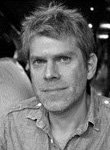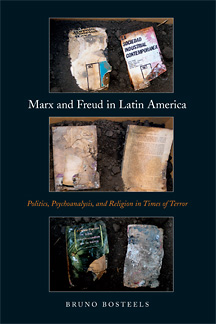Marx, Freud inspire new generation of Latin Americans
By Kathy Hovis

Latin American students and leaders are rediscovering the ideas of such philosophers and thinkers as Marx and Freud – work buried by political and cultural repression during the 1960s and ’70s.
Younger Latin Americans and students of the region are intrigued again by the thoughts that the previous generation’s activists found so inspiring – and by the literature, film, poetry and theory of that time, said professor of Romance studies Bruno Bosteels, whose book “Marx and Freud in Latin America” was recently published by Verso.
At the same time, many Latin American activists from the 1960s and ’70s, now in power after years in exile, are helping to bring back these ideas.
Bosteels’ book presents case studies arguing that art and literature, perhaps more than any militant tract or theoretical essay, can give us a glimpse into Marxism and psychoanalysis and how Marx and Freud inspired activists.

In preparing for his classes on Latin American literature and culture since the 1968 Mexican student rebellion, Bosteels found a lack of resources about the impact of Marx and Freud’s ideas on the activists. Some of the literature that people from the region were reading and writing during that time was literally buried in the 1970s for fear of government arrest and punishment, Bosteels said. Eventually, many people stopped believing in these ideas or else preferred not to talk about them anymore.
In one symbolic case Bosteels discovered, children of activists learned about their parents’ work and actually dug up texts they had buried, which reignited that family’s discussions about radical leftist ideas. Photos of these texts appear on the cover of Bosteels’ book.
“At that time, public debate about Marx and Freud would have been impossible,” Bosteels says, noting that several Latin American countries were ruled by military dictatorships during the 1970s. “But today, the problem is a different one, as my students don’t understand how these texts could possibly be considered subversive.”
For his book, Bosteels scoured used book stores and archives in Latin America to research writings, poetry and film from the time of rebellion and afterward. He discovered many ways that creative people and activists used ideas from Marx and Freud to tackle the elements of their time and determine how they should organize themselves.
In Latin America today, he said, filmmakers, writers and poets are revisiting these ideas along with the utopian idealism of the 1960s. Two of his spring classes – Latin American Film and the Latin American Boom – have focused on 1960s films and literary writings, comparing them to contemporary works. The courses are popular with students wanting to understand the region and investigate the ideas that have shaped its politics and culture.
Bosteels has written articles on Latin American literature and culture and on contemporary European philosophy and political theory. He is the author of “Badiou and Politics” (2011), “The Actuality of Communism” (2011) and the translator of four books by Alain Badiou.
He is now at work on two more books, one focusing on how the idea of the commune has evolved in Mexico and another on the philosophy of defeat and the anti-political movement in certain contemporary theories.
Kathy Hovis is a writer for the College of Arts and Sciences.
Media Contact
Get Cornell news delivered right to your inbox.
Subscribe